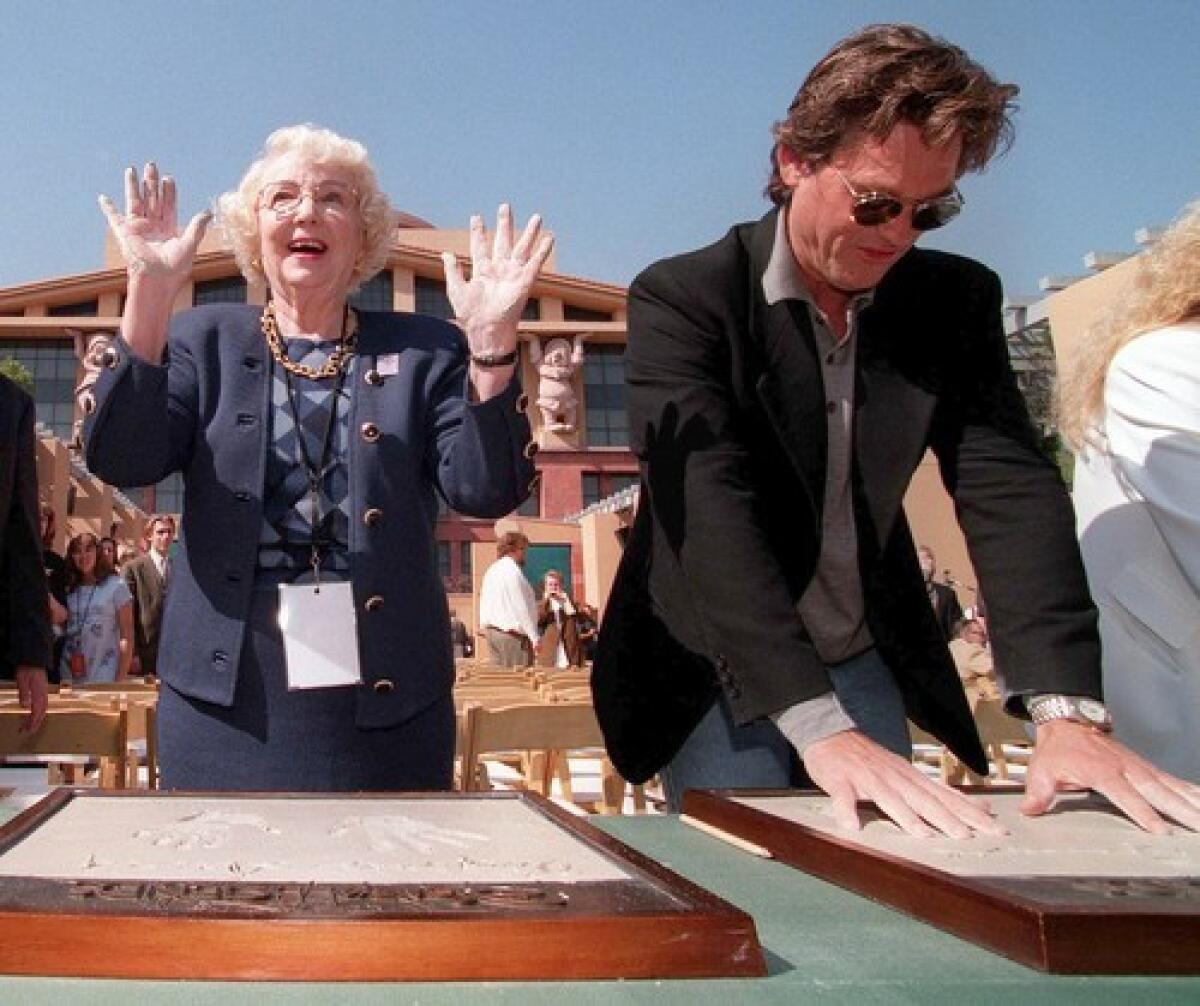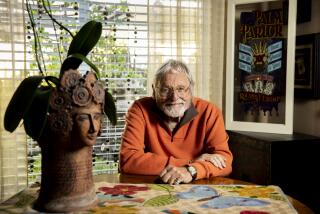Virginia Davis dies at 90; played Alice in early Disney short comedies

- Share via
Walt Disney was a struggling young cartoon filmmaker in Kansas City, Mo., in 1923 when he came up with the idea of having a young girl interact with animated characters in a series of silent comedy shorts.
But who would play the girl?
He found the answer in an advertisement for Warneker’s Bread that he saw on screen at a local movie theater: a little girl with a heart-shaped face, a sweet smile and long, blond ringlets.
Virginia Davis, a 4-year-old Kansas City native with two years of dance and dramatic lessons behind her, would earn a place in movie history as the Disney Studios’ first star, appearing in the first 13 popular “Alice Comedies” produced by Disney.
Davis, whose married name was McGhee, died Saturday at 90 of age-related causes at her home in Corona, said Walt Disney Studios spokesman Howard E. Green.
“Ginny was a very special lady who always took great pride in the historic role she played in our studio’s history,” Roy E. Disney, director emeritus and consultant for the Walt Disney Co. and Walt’s nephew, said in a statement.
“In fact,” he said, “she liked to remind everyone that it all started with Alice, not Mickey Mouse.”
Mickey’s screen debut was still five years away in 1923 when Davis appeared in the first Alice comedy short, “Alice’s Wonderland,” which was partially shot in the Davis family home with Walt directing.
The film begins with Virginia visiting a cartoon studio, which is actually the interior of Disney’s Laugh-O-gram Films office, and Disney himself shows her around. She then goes home, and asleep that night she dreams that she goes to Cartoonland.
Disney’s financially troubled Laugh-O-gram Films went bankrupt several months after “Alice’s Wonderland” was made, and he already had moved to California by the time he sold the Alice series to a New York distributor in 1923 on the basis of the first film.
The contract stipulated that Davis continue playing the title role, and she and her family moved to Los Angeles.
The ensuing eight- to 10-minute one-reel comedies starring Davis had titles including “Alice’s Wild West Show,” “Alice Hunting in Africa” and “Alice’s Spooky Adventure.”
“It was always a little story where I would get into the cartoon through a dream or I was hit on the head with a baseball and suddenly I’d find myself in a world of cartoon characters,” she once explained.
Davis recalled in an interview for a 1998 Disney publication that Walt Disney “was very kind, very patient” as a director.
“I never heard a harsh word from him,” she said. “When we were getting ready to film, he would explain certain sequences and how I should react: ‘There are a lot of animals, wave to them.’ Or, ‘You’re mad at someone.’ He made it interesting and fun. It was a ‘Let’s pretend’ sort of thing.”
After the first series of Alice shorts were completed, Davis’ mother and Walt Disney and his brother Roy didn’t agree on Davis’ pay for a second slate of Alice films, and she left the Disney studio.
Disney went on to make more than 40 other silent Alice shorts with three other young actresses playing the title role before the series ended in 1927.
But Davis, the series’ first star, had made an impact.
“The series of Alice comedies was tremendously important in Walt Disney’s career because it was his first successful series of films,” said J.B. Kaufman, coauthor, with Russell Merritt, of the 1992 book “Walt in Wonderland: The Silent Films of Walt Disney.”
“The charm and appeal and engaging qualities of Virginia Davis,” Kaufman said, “had a lot to do with establishing the series as a success with audiences.”
The daughter of a traveling salesman and a homemaker, Davis was born Dec. 31, 1918.
After leaving Disney, she continued working as a child performer on stage and in other films, including playing Joan Blondell as a child in the 1932 crime-drama “Three on a Match.”
A Hollywood High graduate, she returned to the Disney studio in the mid-’30s, working about six months in the studio’s ink and paint department and doing uncredited voice work on “Pinocchio.”
Davis, who married naval aviator Robert McGhee in 1943, also had an uncredited role as a Harvey Girl in “The Harvey Girls,” a 1946 MGM musical starring Judy Garland.
She later earned a degree from the New York School of Interior Design and worked as an interior decorator and as a decorating editor for the magazine “Living for Young Homemakers” before launching a career in real estate in the early ‘60s.
“Ginny was never one to brag about her Disney connection,” her husband told the Kansas City Star in 2002. “It wasn’t until years after we were married that she told me.”
Kaufman said a turning point in the public “rediscovery” of Davis and her role in Disney’s early career came in 1992 when Davis was invited as the special guest of Le Giornate del Cinema Muto, an international silent film festival in Pordenone, Italy.
“She was such a delight,” he said. “She just charmed everybody, and reporters followed her all over town. She was the toast of Pordenone.”
Davis is survived by her daughters, Margaret Sufke and Laurieanne Zandbergen, and three grandchildren.
A memorial service will be held at 11:30 a.m. Aug. 27 at Holy Cross Mortuary in Culver City. Instead of flowers, donations can be made in her name to the Autism Society of America-Inland Empire Chapter, 2276 Griffin Way, Suite 105-194, Corona CA 92879.
More to Read
Start your day right
Sign up for Essential California for the L.A. Times biggest news, features and recommendations in your inbox six days a week.
You may occasionally receive promotional content from the Los Angeles Times.






